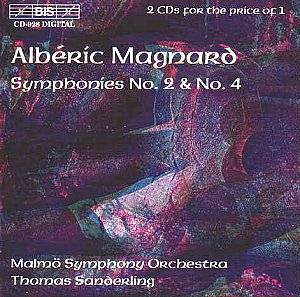Albéric MAGNARD Symphonies No. 2 and 4
 Malmö Symphony Orchestra
conducted by Thomas Sanderling
Malmö Symphony Orchestra
conducted by Thomas Sanderling
 BIS CD-928
BIS CD-928

My early acquaintance with the music of the French composer Albéric
Magnard came as long ago as the early 1960's with the issue on vinyl of a
mono recording of his third symphony by the Suisse Romande under Ansermet.
One of the early masters in stereo, it eventually appeared on stereo LP in
1969. His music struck me then as a highly original voice, not overtly French
as say Debussy or Fauré. Magnard also met his end in an unfortunate
manner, which is another of the curious reasons why I remember him. It was
during the 1914-18 war and the German troops were advancing. As they approached
his house, a shot rang out and the invaders retaliated, burning down his
house and him with it. Well, that's the story, as we know it. It may differ
a little in specific detail, depending upon the nationality of the programme
note writer. He was born of a very well to do family in 1865 and his father
a director of the French newspaper "Le Figaro". As a consequence, he never
had to actually work to make a living and so paid scant attention to the
musical fashions of the day. His artistic credo was "that an artist who does
not draw strength from abnegation is either close to death or to dishonour".
His music, closer possibly to César Franck and Vincent d'Indy than
any other contemporaries, nevertheless is an individual voice - in other
words, conforming to the prevailing French symphonic tradition at the time.
It was always formally perfect and full of dramatic expression, clearly
demonstrating his debt to the classics.
Apart from the early issue of No. 3, there have been sets from EMI with the
conductor Michael Plasson, Hyperion and now BIS, the subject of this review
and CDs of No. 2 and 4. Early performances of No. 2 beginning in 1896 were
not altogether satisfactory and led to revisions. A third performance a little
later did achieve success and major changes were to the second movement,
which he completely re-composed. It is a little suite of four dances, quite
small in scale. The first movement labelled "Ouverture" is in sonata
form, with two themes classical in nature. The slow third movement chant
varié or song with variations. It ends with a final and very effective
last movement. It is interesting that it is the only Magnard symphony that
begins in a major key.
Then came the 3rd symphony first performed in 1899 (also on the BIS label).
The 4th was not begun until 1911, with completion in July 1913.
It was given its first performance in May 1914 and some four months later,
he met his unhappy end. Whilst the composer claimed it was written whilst
he was experiencing utter depression because of his intense patriotism and
anticipating the onset of war, it is far from evident in the music. With
an opening sonata form allegro, after earlier presentation of earlier
themes in a moderato introduction, there follows a scherzo.
The slow movement, which in fact, isn't slow, is in extended song form with
a finale that uses thematic material from the earlier movements.
These recordings are by the Malmö Symphony Orchestra under Thomas
Sanderling, son of the distinguished conductor Kurt Sanderling. I would like
to be able to say that they reflected the care taken over the fidelity of
sound that was always the hallmark of the label's founder Robert von Bähr
- but I cannot. It could be that he is no longer involved. For my taste,
the orchestral texture displays occasional anomalies of balance and rather
forward in recorded sound. On a scale of five, I would only give it three
stars for quality and four for performance. Each symphony is on an individual
CD in a double pack but whilst each is of the order of 40' each, they come
at a price for a single.
Reviewer
Reg Williamson

See also review by Peter Grahame
Woolf who found greater satisfaction with these performances.
